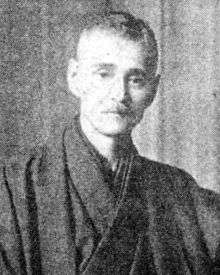Suiin Emi

Suiin Emi (江見 水蔭 Emi Suiin, 17 September 1869 – 3 November 1934) was a Japanese novelist and journalist.
Born in Okayama into a shizoku (former samurai) family,[1] he travelled to Tokyo to join the army but instead joined the Kenyūsha literary society and quickly became celebrated during the Sino-Japanese War for his patriotic stories in the newspaper Chūō Shinbun.[2]
A pillar of the Meiji-era literary establishment, and the editor of Kobe Shinbun and Taiheiyo[3] as well as Senshibankō[4] and Kozakuraodoshi,[1] his writing is marred for modern readers by its imperialist outlook, one example being Osero, a new version of Othello commissioned for the Otojiro Kawakami troupe and set in the Taiwan of 1903, in which the Othello figure, the governor Lt. Gen. Muro Washirō, is a Japanese burakumin who has been sent to the island to suppress a rebellion.[5]
He was the first to refer to sumo as the national sport (kokugi), inspiring the name of the Ryōgoku Kokugikan stadium built in 1909.[6] He died in Matsuyama.
Notes
Bibliography
- Kenneth G. Henshall (ed.), Tayama Katai. Literary life in Tōkyō, 1885-1915: Tayama Katai's memoirs "Thirty years in Tōkyō." Brill Archive, 1987.
- Indra A. Levy. Sirens of the Western shore: the westernesque femme fatale, translation, and vernacular style in modern Japanese literature. Columbia University Press, 2006.
|